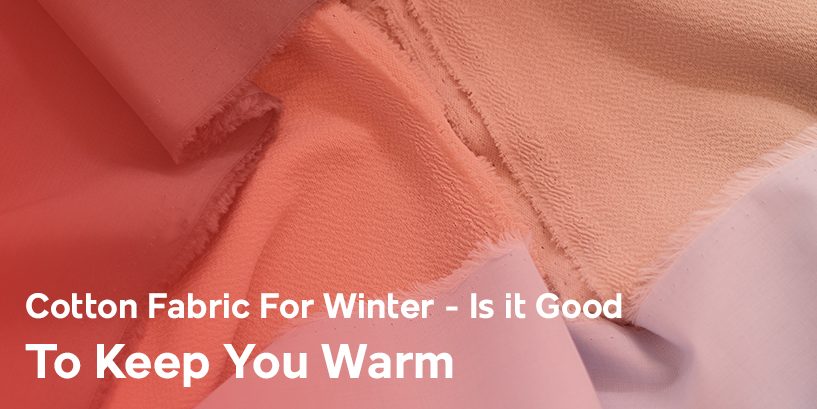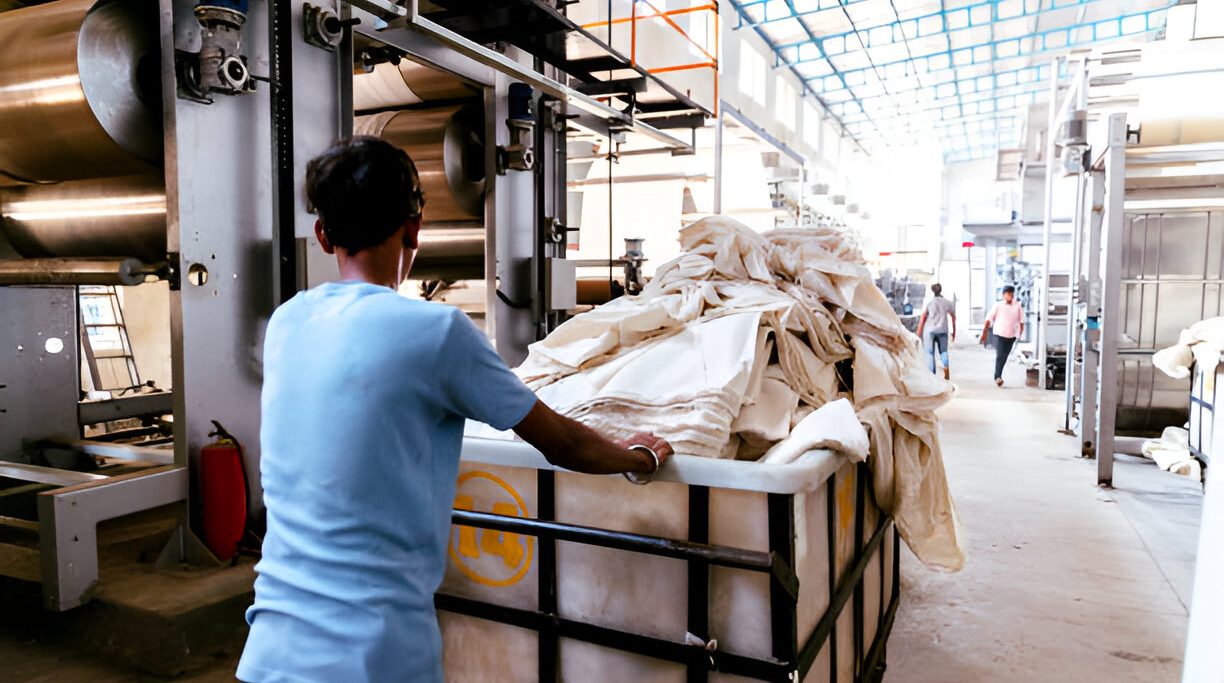Although preferred as summer attire, cotton clothes have now become a part of the conversation about winter wear as well. Tight-knit cotton garments can prevent the cold breeze from getting through while keeping you comfortable.
So in this blog, you will get into the details of why cotton is increasingly being the chosen fabric for winter wear. Cotton is universally the predominant element used to make garments. Its thermal insulation capability offers these products the unique ability to be equally effective in warmer and chilly weather. So naturally, cotton fleece, flannel or cotton-acrylic blends can sustain body warmth in winter.
Seven Reasons Why You Should Get Cotton Fabric For Winter To Keep You Warm
There are several crucial reasons to opt for cotton wear in cold weather, such as-
Cotton Is Weatherproof
Cotton blends are used in the textile market to produce specially designed weather-resistant clothing. These garments are vital in protecting your body from weather extremities.
Cotton is often also preferred because of its comfort level. The breathable nature of these fabrics ensures it is friendly to your skin, no matter what the cosiness in any and every climate. Cotton wears with a weather-repellent finish are designed to make you feel warm even as the thermometer falls down.
Consequently, these outfits become an irreplaceable part of your winter wardrobe selection.
Cottons Can Be Used For Layering
Layering up has always been in vogue for winter style statements. So, gear up your fashion game with comfortable cotton outfits this chilly season. For example, you can pair up a cotton sweater with a thick overcoat for a chic look as you hit the snowy roads. Or opt for multi-layered organic cotton A-line dresses for the next office Christmas party.
Denim jeans have also dominated the market because of their gender-neutral appeal. The skin-tight nature of these cotton wear offers you warmth as you sport them when the temperature drops. Tightly weaved cotton pants are especially effective in offering a snugly feeling in the winter breeze.
Cotton Blends Trap Body Heat
Blended cotton materials made with polyester and wool are adequate to provide much-needed warmth in cold weather. The cotton-wool blend’s natural keratin layer helps the garment trap the body heat as the exterior temperature drops. These fabrics also work as thermal insulators that maintain your body’s heat.
On the other hand, the polyester-cotton blend offers the warmth of synthetic polyester while providing the natural cotton’s comfort. The blend also allows the garment to repel moisture effectively. Because of the polyester element, this blending produces a crimped fabric that significantly reduces the thermal conductivity of the clothes.
Thick Cottonwears Are Comfortable In Light Breeze
Being a versatile fabric, cotton can be used to produce both thick and thin clothes. Whereas the thinner garments come handy during the sunshiny season, their thicker counterparts can make you cosy as the temperature drops.
Fashionistas are now opting for fleece fabric products when picking out their seasonal wear. Moreover, cotton’s soft and durable nature makes them a chart-topper for winter seasonal trends. So, cotton fleece products are a sure-fire option to become a trendsetter this winter. Moreover, these luxuriously soft fabrics have deep piles that ensure better insulation when you wear them.
These outfits are made either via knitting or weaving. A crucial feature of the production procedure of these garments is the mandatory usage of fabric napping. Tailors and stitchers integrate fabric napping to give your dresses a soft, fluffy and velvety surface.
Cotton Is Good For Sensitive Skin
Despite being the go-to option to warm up in winter, polyester and woollen clothes may actually turn out counterproductive for many. For example, those with sensitive skin might feel itchy. In addition, allergy to wool and polyester material can result in watery eyes, runny nose or skin rashes.
So, cotton winter wear presents a reliable means to cover up without enduring any potential discomfort. In addition, full-sleeve washed denim jackets, pure cotton scarves, custom-made hoodies, and other products have rightfully earned a place in the snow season line-up.
Antimicrobial Elements Of Cotton Products
Research has shown that your immune system is more susceptible to the adverse effects of bacteria during the winter season. That is why the fashion discourse of recent times has emphasised on the antimicrobial qualities of the fabrics.
Winter garments remain stored somewhere during the better part of a year. Therefore, these outfits typically do not get washed as often as summer clothes. Moreover, they also lack significant exposure to sunlight due to the weather conditions. All of these facts can result in the growth of microbes in the products. Furthermore, the textile can contain numerous microorganisms, spreading contagious diseases.
So, the antimicrobial cotton wears are produced by surface-modifying the textile through electrospinning, nanotechnologies, plasma treatment, polymerisation, microencapsulation, sol-gel and other methods. These treated cotton fabrics have proven to be bacteria-resistant and able to stop the formation of microbial colonies.
Antimicrobial textiles are also significant due to their usage in manufacturing delicate products like innerwear, bandages, masks, sanitary pads and protective kits.
Cotton Works As A Functional Textile
In recent times, high-end fashion dialectics have been centring on the utilities of smart textiles. These products are specifically manufactured to respond to specific performance requirements.
Cotton is considered a suitable material to form a functional textile by experts. In addition, the longevity and blending suitability of this fabric helps produce outfits capable of responding to external stimuli. So, experiment with a warm cotton parka or high-tech flannel shirt this winter season.
Cotton Fabric For Other Winter Specific Products – Is it Good To Keep You Warm?
Other than cosy jackets and that groovy sweater you got as a Christmas present, cotton fabric is used to produce an array of items for day-to-day use. Keep reading if you wonder which products can help you fight off the chill.
Cotton Beanies
Protecting your ears and head during the chilling winter breeze is essential to maintaining your health. So, definitely add cotton beanies to your list of must-have cold-weather accessories.
If you venture into extremely cool weather, your exposed tissues risk getting crystallised. Referred to as frostbite, this dangerous medical phenomenon can be avoided by ensuring that you are appropriately covered up.
Layering up with usual gloves and jackets cannot keep your body temperature stable on its own. So, a minimal deviation from the standard body heat will cause you to feel the severe impacts of the cold. By protecting your head and ears, a cotton beanie makes sure that you are out of harm’s way from the negative aspects of winter elements.
Cotton Blankets
You can rest assured of having a relaxed good night’s sleep if you use these products during the chilly months. Made from cotton flannels, these medium-weight blankets have a fuzzy finish to provide you warmth in the frosty weather.
Flannel products are also low maintenance and get softer with time. So naturally, the usual tear and wear are significantly less for these blankets, ensuring guaranteed longevity. You can also opt for cotton flannel sheets during this time, as they do not get wrinkly and are easily washable.
Tips On How To Use Cotton Fabric Products
- Hand wash the garments in cold water or use colour catcher sheets during machine wash to prevent discolouration
- Do not dry your cotton outfits on a wash line as that can stretch them out
- To properly eliminate the creases on your cotton wears, iron them both on the inside and outside
- Avoid creasing by not putting the cotton wears folded. It is best to keep them on a thick and shaped hanger
- Do not leave dirty cotton products unwashed for a long while
- Use mothballs as a preservative measure against mould while storing your cotton garments
- Pre-treat your stained cotton clothing with a stain-remover before washing them by hand or in a machine
- Use a heavy-duty, high-performance detergent and fabric softener for the best outcome
So, now you have a clear idea about cotton fabric in winter- Is it good to keep you warm or not. Therefore, bring out your inner fashionistas with the fabulous outfits you will sport this winter season!



